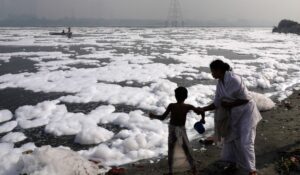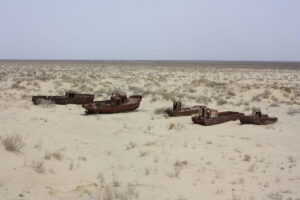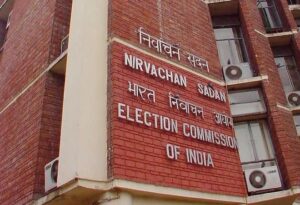Documentaries Rooted In Land, Water & Culture Shine At DIFF

A shot from the film Bhaavi, which was screened at the 14th edition of the Dharamshala International Film Festival (Image courtesy of Balaji Maheshwar)
- At the 14th edition of the Dharamshala International Film Festival, three documentaries stood out for the way they portrayed the environment and its people.
- ‘Last Night I Dreamed It Was Raining Fish’, ‘Rains Don’t Make Us Happy Anymore’, and ‘Bhaavi’ explore three distinct stories: the transforming landscape of Mumbai’s Koliwada fishing village; Lohari, a village now submerged under the Vyasi hydroelectric dam; and Solaganai, a tribal village reviving an ancient well.
- The filmmakers comment about their process, the conscious visual choices and the unique features of their respective films.
This year, at the 14th edition of the Dharamshala International Film Festival (DIFF 2025), held in Dharamshala, from October 30 to November 2, a brilliant set of fiction and non-fiction films from all over the world were screened. Of these, three documentaries stood out, for the way they portrayed people, landscapes, and the transformations shaping our world. The form that each of these films experimented with, added nuance to the issues they discussed, and made the audience look at realities that are often overlooked.
From Mumbai’s Koliwada – a fishing village that is transforming into a metropolis, to Lohari – a village in Uttarakhand submerged beneath the waters of the Vyasi hydroelectric dam, and a tribal community restoring an ancient well near the Karnataka-Tamil Nadu border, these films reveal how stories of land and water are actually stories of people and their culture.
Tuning into the soundscapes of Koliwada
Last Night I Dreamed It Was Raining Fish by Shraddha Khanna is a 16-minute-long short documentary in Marathi, that traces the story of Mumbai through the memories of the Kolis, an indigenous community in the city.

The film begins with a shot of the sea, as the voice-over of an old fisherwoman struggles to recall when the Kolis first became part of this land. It has simply been too long. What follows is a fable rooted in Koli history that refers to ancient gods and the kings who ruled the city. Through the narration of the elderly fisherwoman, chatter of women slicing fish, the flutter of birds, and songs sung in rhythm with the tides, we see Mumbai’s metamorphosis.
The film captures the transition from the intimacy of the fishing village to an island turning into a metropolis; its population swelling, its trees replaced by towers.
At one point, the narrator reflects, “The climax of a story that begins in the hills unfolds across the land and culminates in an estuary,” capturing how water shapes both land and life in this place. The film becomes a story of the Koli community, the sea, and the ecology that connects us all. It subtly raises questions about consumerism, shifting fishing practices, and the indigenous belief systems now fading into obscurity.
According to the film’s director and editor, Shraddha Khanna, the film’s voiceover was inspired by the Marathi poet Arun Kolatkar’s style. He follows the epic-form, a lengthy narrative format that spans over a long period of time. The central protagonist is someone who understands their culture. Much of this style can be seen in the voiceover as it manages to condense a lot of information succinctly.
While speaking about her filmmaking process, Khanna said, “The research began with physically being in that space for a long period and at different hours of the day. I spent mornings, evenings, and nights there in the fish market, watching as the place transformed with the return of people from work, the play of children, and conversations filling the air. I was absorbing the environment.”
The film’s on-location sound recordist, composer, and sound designer, Rounak Maiti, described the voice-over as the film’s anchor, guiding everything else, including the sound. While talking about his process, he said, “Worli Koliwada is sonically fascinating. The sound of nets being cast, boats creaking, and people talking. It’s such a sensorial place. My approach was to go there with a recorder, do a sound walk, and let myself be immersed in the space. The sound design and music emerged from that.”
With its restrained pacing, long cross-fades, and sound design, the film’s form built from shots of the sky, the moon, and archival footage of Koli women, invites us to think beyond what is visible or audible. It speaks little, yet says so much.
A submerged village in the mountains
Rains Don’t Make Us Happy Anymore by Yashasvi Juyal is a 27-minute-long Hindi language short documentary that revolves around a conversation between two long-distance lovers that meanders through their everyday realities, mythological tales and stories from their village Lohari, in Uttarakhand’s Jaunsar-Bawar region, which is now submerged beneath the waters of the Vyasi hydroelectric dam.
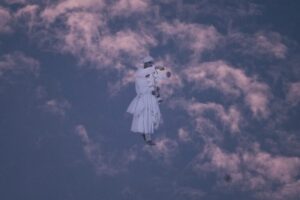
The film opens with a shot of the Vyasi dam and a conversation between the lovers about a myth around gods and demons from the Jaunsar-Bawar region that makes the villagers feel that the god is angry at them. Soon after, we see a man rowing his boat, a rather long and meditative shot. The image is abruptly disturbed by the sound of blasting, representing the moment that changes Lohari’s destiny forever.
In April 2022, Lohari village in Uttarakhand’s Jaunsar-Bawar region was submerged beneath the reservoir created by the Vyasi hydropower project, a 120-megawatt dam built on the Yamuna river in the Dehradun district. Homes, farmlands and cowsheds were destroyed. The government gave the residents only two days’ notice to evacuate. The residents sheltered inside a make-shift setup in a local school. Some of the displaced residents have migrated elsewhere, while others continue to live in temporary shelters.
The film compels you to question the idea of development, one that is needed, but ends up benefiting only a certain section. Hydroelectric projects often uproot people, erase cultures, memories, and ways of life. Most residents of Lohari disagreed with the state’s monetary compensation. They wanted land in place of land, so that they could continue with their way of living.
Talking about the film, the film’s director and editor, Yashasvi Juyal says, “When I began filming in Lohari, nothing was left, everything was gone. I intended to archive the memory of this community. The Jaunsaris are storytellers who miss their way of life, and take immense pride in their culture. Their celebrations are unlike anything in the mainland.” Juyal’s research process involved watching and rewatching recorded interviews with people he met on-ground. To develop a fuller understanding, he interacted with bureaucrats and displaced villagers.
The film has a touch of magical realism which can be felt in the way Juyal blurs the lines between fiction and documentary. Images of submerged land, Himalayan slopes, weathered homes, and a vast water body are layered with the sounds of daily life, nature and construction. The conversation between the lovers, albeit fictionalised, draws deeply from the region’s lived realities and local fables about alternate gods. The conversation carries a tone of longing. Longing for a culture that is likely to be forgotten; longing for a dignified life where lovers can meet, and local livelihoods such as farming and cattle-grazing can endure. Juyal notes that the film’s form is inspired by the Jaunsari community’s story-telling tradition.
When a village comes together for water
Bhaavi (‘the well’ in Kannada), a 62-minute-long feature documentary by Balaji Maheshwar, revolves around the story of a community restoring a 300-year-old well in Solaganai, a tribal village situated along the Karnataka-Tamil Nadu border. Even though the village has other wells to depend on, this well is the main source of water during the summer season.
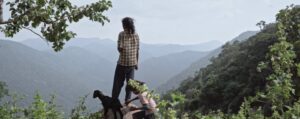
The language spoken in the film is the region’s local dialect, a mixture of Tamil and Kannada. The film quietly observes the well-restoration process, along with the village’s everyday life.
The film opens with a voice-over that introduces the village’s ecosystem and natural resources, revealing the community’s struggle for access to water. What follows is a patient observation of the tribal villagers as they meticulously restore an old well that had been buried over the years by floodwaters and debris from fallen rocks.
The visuals of the restoration process run throughout the film, stitched with glimpses of everyday village life, including cooking, cattle grazing, walks through nature, and moments of interaction. These sequences reveal the community’s deep spiritual connection with their ecosystem. At times, the pacing of the well-restoration scenes feels painfully slow, even exhausting to watch. Yet, as the film progresses, it becomes clear that the slowness is deliberate. It is a way of making the viewer feel the weight and labour of the act itself.
Around the 20th minute lies the most endearing scene of the film in which an old grandmother is preparing a meal for the film’s director, Balaji Maheshwar and a fellow villager. She shares her memory of the well and lovingly asks Maheshwar his reason for filming her. The film itself becomes the answer.
While discussing the community’s involvement in the filmmaking process, Maheshwar says, “I carried my camera with me throughout the day, filming whatever I experienced.” He adds, “I want my viewers to feel what I was feeling. I decided to keep the interaction with the grandmother in the edit because, for me, when she looks at the camera and asks that question, it becomes an interaction not just with me, but with the audience watching the film.”
The way the community becomes part of the filmmaking process stands out. There’s an ease, a shared comfort, between the filmmaker and the residents. Bhaavi documents not only the restoration of the well, but also the resilience of people and their connection with this water source.


